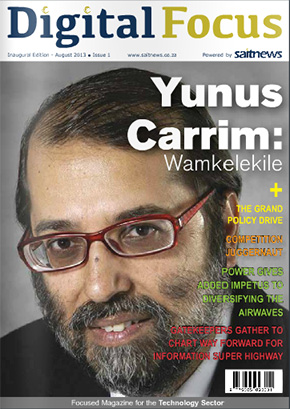Eastern Cape ICT incubator record R6,5 million in turnover
The Eastern Cape Information Communication technology Initiative (ECITI) today announced it had recorded a solid set of results for the 2012/13 financial year with the 20 incubated businesses recording a combined turnover of R6,5 million.
According to ECITI head Patricia Dlamini this is pleasing when measured against total grant funding of R2,4 million from its core funder, the Eastern Cape Development Corporation (ECDC). These enterprises operate mainly in software development, film and design. The best performing sectors were infrastructure and networks followed by communication and media management and film. A total of 60 direct jobs were created by the enterprises during the year. A further 63 indirect jobs were created.
While the turnover amount is decidedly lower than the R9 million generated enterprises in the 2011/12 financial year, this is not an indication of decline in the financial performance of the businesses. In the 2011/12, ECITI graduated three enterprises from its programme. As such, during the two year graduation cycle, turnover naturally increases because companies that are ready to graduate are financially sustainable. Turnover was therefore indicative of the readiness of the businesses to graduate from the programme. The period under review is the first year of the new two-year cycle.
“ECITI identified a need to expand its offering to reach beyond the confines of East London. Based on the challenges of slow economic growth, expanding the reach of entrepreneurship and capacity development will offer job creation and poverty reduction opportunities. This calls for a bigger financial investment and commitment of patient capital in support of the broad based entrepreneurship capacity development objectives.
“The organisation is excited that the growth in the market demand for ECITI services became an opportunity to explore alternative long-term funding opportunities through the Department of Trade and Industry’s recently launched Incubation Support Fund. The dti has committed a total of R11 million over the next three years to ECITI,” Dlamini says.
These funds will aid in the expansion of the business into the rural areas of the Eastern Cape that underdeveloped, under-resourced and marginalised.
“ECITI is better placed to coordinate all provincial efforts in order to bridge the digital divide, particularly in reaching out to the rural communities so that these can explore the use of ICT and film for the development of communities. ICT creates a powerful medium through which rural communities can transform their lives and create livelihoods the enterprising aspects of ICT and film,” explains Dlamini.
Dlamini says ECITI, a subsidiary of development financier, the Eastern Cape Development Corporation (ECDC) supported a total of 20 enterprises of which 60% were part of the virtual incubation programme. These virtual enterprises are located in areas outside East London such as Butterworth, Dimbaza, Mthatha, King William’s Town, Queenstown and Stutterheim. The increased appetite for incubation from enterprises located away from the main centre has resulted in a decision to establish satellite incubation centres in the OR Tambo and Chris Hani regions. This decision should bring ECITI services closer to its clients.
She says provincial Department of Economic Development and Environmental Affairs and Tourism (DEDEAT) also established an ICT task team led by ECITI and Innovate Eastern Cape. The task team will identify ICT infrastructure gaps within the province, classify available ICT skills and gaps, find existing ICT projects and programmes within the province run by the public or private sector as well as to develop a comprehensive project proposal as a basis for DEDEAT to engage the national Department of Communication (DoC) around provincial ICT issues. ECITI has been tasked with championing these initiatives to support economic development initiatives.
ECITI is also collaborating with DoC and its state-owned companies in the implementation of several projects which they have identified within the Eastern Cape. These projects are related to connectivity initiatives in the rural parts of the province through the establishment of ICT labs in these areas.
“These projects have enabled ECITI enterprises to become the primary implementers locally and to offer post-establishment maintenance and aftercare support. For example, an ECITI incubate, Khula Technologies was appointed to establish labs and post-establishment aftercare support at Sobantu and Nathaniel Pamla high schools in Peddie.
“The organisation was also tasked with the championing, strategic planning and implementation of the fifth annual ICT Summit. ECITIs role is viewed as the relevant conduit that government can invest funds in to enable the conference,” Dlamini adds.
ECITI also formed a partnership with the East London IDZ to locate its premises at its Emonti Science and Technology Park as part of the bigger value chain creation in industrial development. ECITI relocated to the STP in July 2012 enabling the business of the organisation to strategically position itself for maximum value for its clients.










